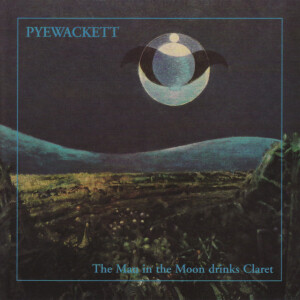 Pyewackett were one of those groups that defied categorization: experimenting with English traditional material, early music from France and Italy, and electronic music. While playing as a dance band with a caller, they also played in concerts in the UK, and abroad as part of the British Council tours. It’s not surprising to learn that Pyewackett’s members met at university in the late 1970s, where their common interests led to a very creative ensemble with an entertaining repertoire.
Pyewackett were one of those groups that defied categorization: experimenting with English traditional material, early music from France and Italy, and electronic music. While playing as a dance band with a caller, they also played in concerts in the UK, and abroad as part of the British Council tours. It’s not surprising to learn that Pyewackett’s members met at university in the late 1970s, where their common interests led to a very creative ensemble with an entertaining repertoire.
This album, re-released several years after the band had moved on to other projects, still works – for the most part. The fusion of folk and contemporary material is often unkind to the newer sounds, and it’s well worth remembering that the ballads and melodies that have endured through time have survived a winnowing process that synthesizer lines from the early 1980s have not. There are some smarmy, triumphant synthesizer effects that detract from the clever arrangements and unusual combination of instruments that make up Pyewackett’s repertoire. Thankfully, these passages do not dominate The Man in the Moon Drinks Claret, which will stand the test of time far better than many fusion projects.
I imagine that some of the current Celtic music drawing on a world music theme will fare much worse than Pyewackett’s very creative work – “pop music from five centuries” as one of their posters read.
Pyewackett were Ian Blake (woodwinds, lute, bass guitar, synthesizer), Rosie Cross (vocals, bassoon, hammer dulcimer), Mark Emerson (fiddle), and Bill Martin (piano, guitar), with Micky Barker (percussion). They were able to interpret a wide variety of music with exuberance, allowing both the individual instruments and the arrangements to shine. Much of their material came from John Playford’s The Dancing Master of 1651, a source of much inspiration to those playing in the Anglo folk traditions, but somehow the other, diverse material also seems right, perhaps because of the strong vocals, tight harmonies, and unusual combination of woodwinds and strings. The classic themes of British Isles folk music form a core linking the material together. Murder, incest, visits from the beloved dead, a springtime romance, and the fairy folk all appear, surrounded and supported by some really nice instrumentals that evoke a magical gig, perhaps from time gone by.
Of course the synthesizer lines may suggest a magical gig from times to come – do they play folk music on the Enterprise? But I digress… I particularly enjoyed the use of strings and woodwinds – the bassoon rarely makes an appearance in folk circles, but its bouncy, round bass sound really contributes to the sense of the ancient-made-modern that Pyewackett created.
There are some real gems on this disc. “Tam Lin” is well done, in a spare arrangement, with Cross’s vocals reminiscent of June Tabor’s as she sings in the lower part of her range – although the twangy bass is a bit distracting at the close of the song. “Ce Mois de Mais” is jaunty and exuberant in its celebration of spring – with a renaissance 16th century flavour composed of layered vocals and woodwinds – lovely and never stiff. “The Well below the Valley” evokes an isolated rural misery for the mother of nine murdered children born of incest, all with an upright chorus sung in harmony. I also really liked portions of the opening track “Amoroso,” and the final “Dan and the Wombat,” both instrumentals, which have some lovely woodwind and fiddle passages.
The Man in the Moon Drinks Claret recalls a very vibrant, creative time for English folk music; it’s a lively and vivacious listen that maintains its uniqueness and charm after almost two decades of various other folk music fusion projects. Give it a listen for both the trip down memory lane and to put some perspective on more recent attempts to bring the synthesizer into the folk idiom.
(1982, Music and Words re-release, 1994)
